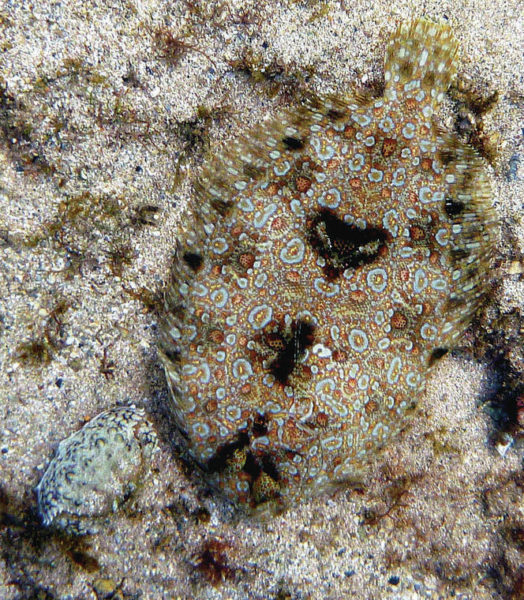Published in the Ocean Watch column, Honolulu Star-Advertiser © Susan Scott
November 30, 2019
Last week I received an email that made my day. “I swim a lot at the lagoons of Ko Olina,” Charlie wrote. “I often see a box/shame-faced crab on the bottom, and when I do, there is often a flounder (pakii) nearby following the crab. One time I watched the flounder give the crab a ride on its back. Do you know what the relationship is between the crab and the flounder? They seem to be working together.”
Charlie didn’t have a picture of this fish-crab alliance, but in searching my own photos of the two marine animals, I found a 2012 photo series I had taken of a peacock flounder.
 A peacock flounder with its box crab buddy,
A peacock flounder with its box crab buddy,
lower left, was found on Oahu’s North Shore.
©2019 Susan Scott
I wondered why I saved so many shots of one fish, but soon saw the answer on the sides of the photos. The flatfish had been fluttering along the ocean floor with a box crab running along next to it, just as Charlie described.
I was slow in noticing the crab in the pictures because the two unrelated creatures are so well camouflaged. Usually, the only times I see them is when they move as I pass by.
Hawaii hosts 18 species of flatfish. All are known in Hawaiian as pakii, meaning fallen flat or spread out. Three species, called soles, are only 3 to 5 inches long. The other 15 are flounders, ranging from shallow to deep water. The largest and most common of Hawaii’s flounders is the lovely peacock, or flowery, flounder, growing to 19 inches long.
Flatfish are some of the weirdest fish in the sea. All start life as normal-looking, normal-swimming fish with an eye on each side of the head. As the youngsters mature, though, one eye travels over the top of the head, joining the other, and the body becomes pancake flat. From then on, flatfish live blind side down on the ocean floor.
Like octopuses, flatfish can instantly change skin color to match their backgrounds as they skitter about searching for food. The nearly invisible flatfish are ambush predators, but some follow jacks, goatfish and other hunters to grab small prey that gets flushed out.
About flatfish, local marine guide author John Hoover writes that they associate with Kona crabs. As Charlie and I both witnessed, flatfish also hang out with box crabs.
Hawaii hosts at least six species of 2- to 6-inch-wide box crabs, all called pokipoki. Box crabs are also hunters, and can open snail shells with their formidable claws. Best to leave these little darlings alone. A box crab once opened my thumb when I picked it up.
When resting, box crabs fold their shieldlike front claws over their mouths and faces, earning them the nickname shame-faced crabs.
I may have once seen a peacock flounder with its box crab pal, but I never saw them ride-sharing. Thanks, Charlie, for enlightening us about this extraordinary partnership.